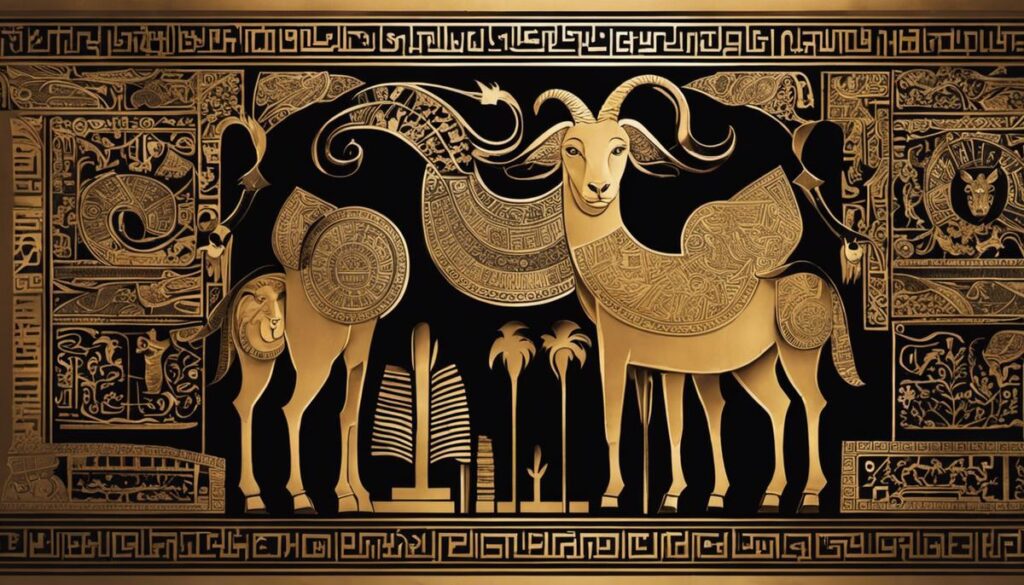Ancient wisdom and spiritual mysteries often find their expression through the enigmatic language of dreams, with symbols that resonate through centuries of human consciousness. Indeed, one potent symbol exemplifying this is the act of ‘catching fish’, a representation requiring a deep dive into the ocean of biblical narratives, interpretations, and implications. Bridging the gap between spirituality and the subconscious, the upcoming exploration will shed light on how this dream symbol transcends the veils of time, its historical significance, and adaptability amidst evolving cultural forms.
In order to fully appreciate and understand the symbol of catching fish, we shall embark on an enlightening journey, commencing from the roots held in biblical tradition, to its prevalence in dreams – an often mysterious yet enticing phenomenon. By investigating specific biblical accounts, analyzing scholarly perspectives and alignifying it with contemporary contexts, a profound comprehension of this concept will be stitched together. An exploration that provides not only a richer understanding of biblical dream symbols but also adds new dimensions to personal introspection and spiritual exploration.
Understanding Biblical Dream Symbols
Biblical Interpretation of Dream Symbols: A Focus on Catching Fish
Understanding the complex tapestry of biblical symbolism and its interpretation—particularly as it pertains to dreams—involves both meticulous scholarly examination and contextual analysis. The symbol of catching fish, recurrent in numerous biblical dreams, provides a fascinating avenue for exploration.
The Bible, an amalgamation of historical records, prophetic visions, and moral teachings, often employs symbolic language to express profound truths. Foremost among these is the symbolism of fish, woven throughout the biblical narrative, from the Old Testament’s Jonah in the belly of a ‘great fish’ to the New Testament’s depiction of Christ’s disciples as ‘fishers of men’.
Fishing, as a motif within the Biblical dream, is worth delving into given its deeply ingrained significance. This symbol of catching fish primarily serves as a metaphor for evangelism or soul winning in the New Testament. The first instance appears in the Book of Matthew 4:19, where Jesus tells Simon Peter and Andrew, two fishermen, “Follow me, and I will make you fishers of men”. The act of fishing here symbolizes discipleship, with the fish denoting souls drawn to the teachings of Christ.
Similar themes radiate in other parts of the Bible. The abundant catch in John 21:6, for example, is often interpreted as the abundant spiritual harvest that awaits those who follow Christ’s directives. Here, the bounteous pull of fish from the sea represents the multitude of individuals who could be led towards salvation.
However, interpretations are often contingent on contextual cues within the dream. In some cases, the dream of catching fish may indicate divine provision or blessing, stemming from the account of the miraculous catch in Luke 5:4-7. In this context, the fish, an essential source of sustenance, plays a potent symbol of God’s miraculous intervention to meet the needs of his followers.
Biblical interpretations of dreams have perennially spurred scholarly discourse within religious academia. The symbolism of catching fish, embodying notions of discipleship, salvation, divine provision and blessing, conclusively underscores the multilayered complexity of dream interpretation within biblical exegesis. It reiterates the Bible’s multidimensionality, its lucid symbols operating at several levels, offering readers and scholars a perpetual source of engaging and rigorous study.
Throughout these narratives, what remains clear is that the biblical symbol of catching fish, laden with intricate meaning, marks a rich area of symbolic study. It highlights the importance of dreams as a vehicle for divine communication and provides a compelling lens through which biblical readers can explore and deepen their understanding of these sacred texts.

Catching Fish as Symbol in Biblical Dreams
Interpreting dream symbols within the context of Biblical literature is an intriguing undertaking that combines the complexity of religious symbolism with the subjective terrain of dream exploration. A particularly noteworthy example of this is the act of catching fish in a dream, a symbol steeped in biblical and theological nuance.
As we delve deeper into this matter, we should not discount the profound influence of Christian tradition on our understanding and interpretation of these symbols. The fish as a symbol is inextricably entwined with the Christian faith, primarily because of the members of early Christianity who used it as a clandestine symbol to identify one another. Hence, the act of catching fish can indeed signal fellowship or collective identity.
Continuing on this thought, the act of catching fish can symbolize participation in the Christ-centered community. In the Gospels, notably in Luke 5:1-11, Jesus invokes the metaphor of fishing as He calls His disciples to become “fishers of men”. In the poignant context of this passage, where we see ordinary fishermen transformed into apostles, an abundant catch signifies vocational call and response—a decision to dedicate one’s life in service of a higher purpose, led by spiritual commitment.
Equally important is the perspective of faith as it pertains to the mystery of providence. Catching fish could represent the manifestation of God’s providence, as faith invites an unceasing reliance on God’s guidance and support. In dreams, this may serve as a comforting reminder of divine assurance, particularly in turbulent times. This is however a statement of measured inference rather than concrete interpretation, as the diversity in individual dreams and contexts can blur the lines between subjective elements and objective symbols.
In the field of dream analysis, the practice of catching fish could equally symbolize the pursuit of wisdom or knowledge, drawing from the depth of Ecclesiastes 7:19 where wisdom is deemed superior to the tools of the fisherman. If we employ this understanding, the act of catching fish represents an endeavor to seek and embrace wisdom, possibly divine wisdom, thus enriching one’s spiritual orientation.
These interpretations, though rooted in biblical recognition and scholarly investigation, should be viewed as possibilities rather than absolutes in the realm of dream symbolism. As intricate as dreams can be, they remain subjective experiences that reflect the dreamer’s personal, spiritual, emotional, and sociocultural circumstances. As such, the act of catching fish in dreams serves as a compelling reminder of the multi-dimensional nature of dream interpretation within biblical exegesis, one that invites us to journey on a path of ongoing inquiry, understanding, and spiritual discovery.
Image Description:

Case Studies in the Bible
In the diligent exploration of specific biblical accounts pertaining to the symbolism of catching fish in dreams, several noteworthy incidents surface which warrant contemplation and engagement. One of the most iconic narratives found in the Gospel occurs in Luke 5:4-11, presenting the miraculous catch of fish. In this account, after a futile night of fishing, Peter, at the instruction of Jesus, casts the net one more time and catches an overwhelming amount of fish. One interpretation posits this event as a significant metaphor for the future ministry of the disciples, foretelling the vast spiritual “catch” they would make in spreading the Gospel message.
Further examples may be discerned within the context of interactions among early Christian communities, as-for instance-in Acts 2:41-47, capturing the increase of the church’s numbers after the disciples’ preaching, symbolically represented as a fruitful haul of fish. The evocative imagery of catching fish does not merely insinuate a quantitative increase, but it signifies the spiritual transformation undergone by those ‘caught’ – a metanoia or radical change of heart and mind.
Critically, historical context and specific narrative circumstances form an essential part of interpreting any dream symbolism in biblical accounts. Acts 10:9-16 narrates the story of Peter’s dream of a large sheet containing various animals, which is postulated as a metaphor encompassing the Gentiles in the evangelical mission. Here, the concept of ‘catching’ or ‘gathering’ is extrapolated beyond the mere symbolic realm of fish, underscoring the broad, inclusive scope of God’s salvific outreach.
It is also necessary to acknowledge the significant influence of broader cultural and religious tradition on understanding these particular symbols. For instance, in some Christian iconographic traditions, the fish is regarded as a cipher for believers, particularly bearing the acrostic symbolism of ‘ΙΧΘΥΣ’, the Greek word for fish, emerging as an acronym for ‘Jesus Christ, Son of God, Savior’.
The symbolism of catching fish, inherent in these biblical accounts, extrapolates much more than a vocational call for disciples – it controverses themes of reliance, trust, and faith in divine providence, and in the transformational power of faith. Insights from these cogitations could potentially influence individual and collective encounters with faith, eliciting a deeper spiritual introspection, and prompting a pursuit of wisdom and knowledge predicated on personal, sociocultural, and emotional contexts.
In essence, the exploration of biblical dream symbolism, such as catching fish, offers a rich tapestry of interpretative possibilities, furthering our understanding and appreciation of sacred text and nurturing deeper spiritual engagement. These symbolic narratives invite ongoing scholarly inquiry and also personal contemplation, underscoring the dynamic and evolving relationship between the sacred text, its interpretation, and its impact on spiritual formation and experience.

Modern Interpretations and Relevance
In the sphere of biblical dream interpretation, catching fish continues to hold profound relevance today, signifying an array of deep and thoughtful concepts. Primarily, the act of catching fish, wrapped elegantly within the fabric of Biblical writings, reflects the agrarian metaphors of planting, sowing, and reaping. This narrative holds a mirror to contemporary society’s approach to spiritual growth, outreach, and service.
The miraculous catch of fish as narrated in Luke 5:4-11 metaphorically characterizes the disciples’ future ministry. This Biblical account highlights the efficacy of obedience and reliance on divine instruction – a scenario that resonates with contemporary emphasis on faith. The poignant calling of the first disciples, who were fishers by profession, allowed immediate comprehension of this miracle’s symbolic depth. They were to ‘fish for people,’ translating their daily labor into the spiritual realm and depicting their evangelistic mission – a kernel of wisdom holding relevance today in recognizing and pursuing one’s vocation.
Similarly, the exponential growth of the early church, as referenced in Acts 2:41-47, is symbolized as a fruitful catch of fish. Here, the symbolism speaks of unity, fellowship, and collective empowerment in establishing early Christian communities. Today, this symbolism inspires unity within numerous faith-based organizations, emphasizing the potential reward of spiritual communal endeavors.
However, it’s pivotal to discern the significance of contextual and narrative conditions in biblical dream symbolism. Without this perspective, symbol interpretation could venture into the domain of eisegesis – imposing one’s perspective onto the text, instead of understanding the text within its original context (exegesis).
Consider the account of Peter’s vision in Acts 10:9-16. Though not strictly a dream, it offers keen insights about ‘catching’ or ‘gathering’ beyond fish, suggesting all people’s inclusivity within God’s scope of love. It underlines the expansive nature of divine outreach, from the ethnic Jewish community to all nations. This interpretation validates values of inclusivity, tolerance, and multicultural appreciation in the contemporary setting.
Cultural and religious influences significantly determine the understanding of fish symbolism, as echoed within Christian iconography. We frequently encounter fish symbols in sculptures, carvings, and paintings, perpetuating the rich tradition of Christianity’s consciousness. This infusion of history into contemporary art maintains a palpable connection between the past and the present, exhorting audiences to reflect upon these interconnected narratives.
Reliance, trust, and faith in divine providence are emphasized in worming themes in dream symbolism concerning catching fish. This interpretation cultivates much-needed resilience, especially amidst challenges, serving as a constant reminder of divine intervention and guidance in personal journeys.
The transformative power of faith affects personal and collective spiritual introspection, a truth encapsulated within these biblical narratives. Biblical dream symbolism thus invites a pursuit of wisdom and knowledge, inspiring continual spiritual growth and personal development.
Finally, apprehending the richness of interpretative possibilities integral to biblical dream symbolism opens gateways of understanding. This exploration enhances the discourse subjectivity, examining dream symbols from diverse viewpoints – the social, the personal, emotional, spiritual, and other cultural or psychological interpretations.
This realm of interpretation thrives within the intersection of the sacred text and personal experience, birthing deep-rooted and enriched spirituality. Thus, the interpretation of catching fish in dreams in biblical narratives reciprocally influences and is influenced by contemporary realities, extending the invitation to ongoing scholarly inquiry and personal contemplation. As a result, the relationship between sacred texts, interpretation, and spiritual formation is a continually evolving realm shaped by time, culture, and personal experience.

Going beyond the surface meanings, our dive into the depths of ‘catching fish’ as a dream symbol, manifest startling revelations. We discover it as a versatile signifier that carries intricate connotations from historical, cultural, spiritual, and personal viewpoints. The exploration provides profound insights into an ancient art: dream interpretation, and its immense significance in our contemporary settings. It exemplifies how, transcending the timelines, these symbols never cease to enrich our spiritual understanding, deepening it with every path we trace back in time.
As the lens of understanding widens, we realize that these symbols are not confined within the boundaries of biblical or dream contexts. Instead, they represent universal themes of human existence, narrating stories of struggle, hope, redemption, and transformation. Such symbols like the act of catching fish, thus holds a mirror to humanity, reflecting not only our collective subconscious but also pinpointing the spiritual direction that our life’s compass may follow.







